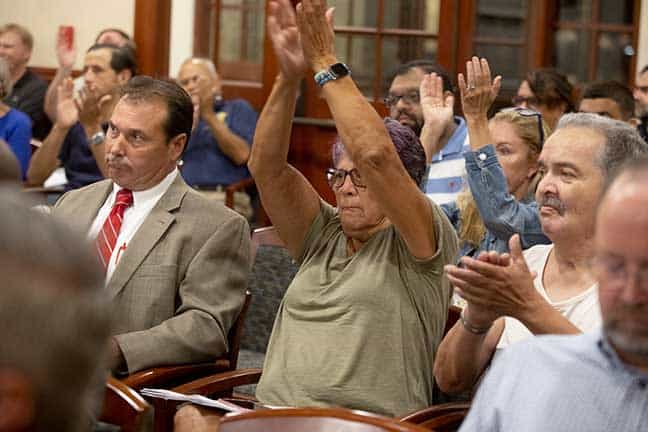Planning commission: motel ordinance needs more work

Bryan Trunik, left, and Virginia Ramirez react to a resident’s comments during the Claremont Planning Commission on Tuesday. Following a three hour meeting the commission sent a proposed motel ordinance back to city staff with the instructions to call a joint meeting of the planning and police commissions to make changes to the ordinance. COURIER/photo Steven Felschundneff
by Steven Felschundneff | steven@claremont-courier.com
After months of pleading with the city for action on a special ordinance to curb criminal activity emanating from motels near the 10 Freeway, numerous residents from south Claremont attended the Claremont Planning Commission on Tuesday to urge it to reject its proposed ordinance.
Their reasoning was simple: the version of the motel ordinance on the commission’s agenda, in their view, would be ineffective at curbing the ongoing problem of sex work and other criminal activity surrounding The Knights Inn, Claremont Lodge and Motel 6.
The commission voted 6-0 to send the ordinance back to staff for more work, which will include a joint “workshop” type meeting between the police and planning commissions as well as the public. Before that meeting can be scheduled it will have to be approved by the police commission.
During public comment one speaker after another described the seemingly constant stream of sex workers plying their trade on Indian Hill Boulevard adjacent to the motels, and how they have been forced to shelter their children when passing through or avoid the area altogether. Many had hoped the city would adopt strong requirements on the motel operators to combat the criminal activity but expressed concern the proposed ordinance did not achieve that goal.
A chief topic among those who spoke was a perceived lack of outreach from the city to the residents of south Claremont to help craft the rules in the ordinance. They proposed using an existing ordinance in Long Beach as a model for the one here.
During several recent city council meetings, Bryan Trunik has been a strong voice advocating for a motel ordinance. He claims to have hundreds of hours of video of alleged sex workers and their customers coming and going from the motel near his home, but questioned whether the people drafting the ordinance have even visited his neighborhood.
“Frankly most of us here in the audience were shocked on Thursday when we suddenly get something from the city that’s totally contrary from what we expected,” Trunik said. “We were expecting enhancements on the City of Long Beach ordinance and instead we get the city removing stuff, making it easier for the motels to do their business. So, we are furious reading that.”
The perception of being marginalized was inflamed by Claremont Planning Commission Chair Leigh Anne Jones when she proposed that public comment be cut from four minutes per person down to two to accommodate the large number of attendees. Later she explained that her suggestion, which was implemented, was an effort to give everyone a chance to speak and keep the proceedings form extending late into the night. The length of recent public meetings has generated a substantial number of complaints from people who say they can’t participate if the meetings run too late.
According to a staff report from Brad Johnson, community development director, “The City’s hotels and motels are a valued and much-needed community amenity and a driver of the local economy. However, for at least the past decade, the City’s Police Department, Community Improvement Division, and Planning Division have been working with motel owners to address criminal, code enforcement, and nuisance activities in and around certain motels located near the I-10 freeway. These activities have worsened in recent years. At this year’s Priorities Planning Workshop, the City Council adopted an objective to evaluate amendments to the City’s existing Hotel/Motel Ordinance.”
In April the police commission adopted a “statement of direction,” which was then sent to the city manager’s office and City Attorney Alisha Patterson to hammer out a recommended ordinance specifically crafted to address the situation in Claremont. Because the ordinance would alter the city’s zoning code, implementation requires planning commission, and ultimately, city council approval.
City staff recommended the commission repeal the existing hotels/motels ordinance and replace it with one that staff had developed referred to as “Version 2.0.” Alternately, the commission could adopt the draft developed by the police commission known as “Version 1.0,” combine the two versions, keep the existing ordinance, reject all revisions, or send it back to staff for more work.
The proposed ordinance contains provisions that would only apply to any motel within a half-mile radius of the intersection of Indian Hill and the 10 Freeway, which effectively excludes Casa 425 in the Village, and the DoubleTree on Foothill Boulevard, from having to comply with those rules.
“It is important to note that the Police Commission created its Statement of Direction as a starting point without the benefit of input from City staff, the City Attorney’s Office, or stakeholders in the hotel/motel industry,” according to the staff report.
One of those stakeholders was Jim Abrams, a legal advisor for the California Hotel & Lodging Association and the California Association of Boutique & Breakfast Inns, both of which advocate for the lodging industry.
Several of the recommended changes from Version 1.0 to Version 2.0 were implemented to accommodate concerns brought up by Abrams or local hotel managers. For example, a ban on stays of less than 18 hours in the original draft was edited to convey that room rentals “generally must be for at least one ‘overnight’ stay (with ‘day use’ exception).” This came about in part because the DoubleTree offers rooms during the day, which are popular with people attending conferences or conducting business in town.
Some confusion occurred early into the meeting when Assistant to the City Manager Katie Wand revealed there was an addendum to the agenda referred to as “Version 3.0,” which included additional alterations to the proposed ordinance.
The addendum was printed and available at the entrance of the council chamber, but due to an oversight, had not been distributed to the planning commissioners as they sat down at the dais. As a result, they were not able to read the document before the start of meeting. A copy had to be emailed to commissioner Parker Emerson who was participating via Zoom.
City Manager Adam Pirrie said on Wednesday that ideally “Version 3.0” would have been included in the agenda packet but had been prepared by his staff in the preceding several days to incorporate input from residents.
“That was an attempt to give the commission an option to move the item forward and address some of the concerns from public comment, which was received up until Tuesday,” Pirrie said.
As the commission commenced its discussion, it was clear the proposed ordinance would have trouble moving forward because several members had numerous questions about the draft document.
Commissioner Melinda Gonzalez expressed interest in seeing statistics specific to the city of Claremont about sex trafficking and the number of prostitution arrests.
Police Chief Aaron Fate responded that tracking people who are being trafficked is extremely difficult because they often lie about their circumstances even during an investigation. The arrest data could be provided but he said he did not have it with him that evening.
Gonzalez also expressed some concern about the requirement to provide either a credit or debit card plus some type of government identification to register for a room.
“I guess my question is how could this adversely affect an undocumented person when only 16 states allow undocumented [people] to obtain an ID?” Gonzalez said.
Commissioner Tom Andersen had questions about what exactly constitutes a guest as defined by the ordinance, and whether somebody could pay for the room and provide the necessary identification, but not actually stay for the night.
“Could that potentially be a straw man? Somebody hired by the pimp to pay for the room?”
Fate responded that scenario was possible.









0 Comments